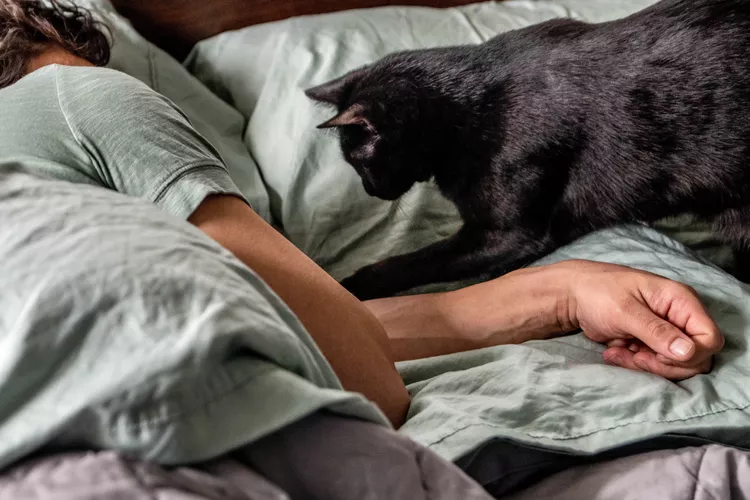They say “curiosity killed the cat” because cats tend to want to check out everything in their environment, and sometimes cats do not know to avoid things that might harm them. If you are eating something, chances are your cat would like for you to share. As a practicing veterinarian, I am often asked about what human foods are safe to share with our cats, including if cats can eat tomatoes.
Cat Nutrition
Cats are truly meat-eaters. In contrast with humans and dogs, cats are obligate carnivores. This means that at least 70 percent of their diet must be meat. Though cats will eat fruits, veggies, and grains, they do not require them. A cat cannot be a vegetarian or vegan.
Many owners wonder if they can or should feed “human” food to their cats. In general, a cat should derive all of their calories from high-quality, balanced cat food. However, giving a cat a treat can help strengthen the human-animal bond and may be used in training. Commercial cat treats may be offered, but small nibbles of food typically intended for humans may be used as well—as long as you know they are non-toxic to cats.
Can Cats Eat Tomatoes?
If tomatoes are on your menu, you may find that your cat is not interested, as most cats do not prefer this ruby-red fruit. But what if your cat does want to eat your tomato?
Tomatoes are a healthy fruit for humans, full of antioxidants and vitamins. Tomatoes are a great source of vitamins A, C, K, potassium, fiber, and lycopene, a compound found in high levels in tomatoes, that has been shown to have many health benefits for people.
With all of that being said about the health benefits of tomatoes for humans, it is a mistake to assume these properties hold true for cats eating tomatoes. Cats’ gastrointestinal systems are not designed to digest tomatoes, and if eaten in larger quantities, they may cause stomach pain, vomiting, or diarrhea.
It is important to note that green tomatoes that are not fully ripened, as well as their stems and leaves, pose a bigger danger to your cat. Unripened tomatoes and all parts of the tomato plant stem and leaves are toxic to cats. The toxic compound in these green parts of the plant is called solanine, and it is toxic to cats and many other animals. If a cat eats a tomato that is not ripened or the leaves or stems of a tomato plant, it may experience gastrointestinal distress, lethargy, a dangerously slow heart rate (bradycardia), and severe vomiting. Green tomatoes that have been cooked thoroughly are safer as they do not contain active solanine, however, they can still cause an upset stomach if eaten in large quantities.
How Much Tomato Can Cats Eat?
If you have a cat that has a taste for tomatoes, you may safely feed them tiny amounts of the ripened flesh of the fruit from time to time. It is recommended that you limit the amount of tomato flesh eaten to just one or two bites, however. If larger quantities of the fruit are consumed by your cat, watch them carefully for any signs of gastrointestinal distress such as vomiting, stomach pain, or diarrhea. If any ill effects are seen, contact your veterinarian immediately.
Final Thoughts
In the case of sharing tomatoes with your cat, a few small nibbles of the ripened flesh of a tomato is likely not a cause for concern. However, not fully ripe tomatoes, stems, and leaves should definitely be avoided. If your cat eats any of the above, please contact your veterinarian right away.
Because cats are true carnivores and require that at least 70 percent of their diet be made up of meat, it is critical to ensure that they are being fed a meat-based diet. Treats should be kept to a minimum—no more than 10 percent of their total daily calories. If too many snacks or treats are given, the cat may become too full to then be able to ingest an adequate amount of its regular diet. This may lead to nutritional deficiencies and serious illness.
As always, if you have any questions or concerns about your pet’s health or what to feed your cat, you should always reach out to your veterinarian.




















